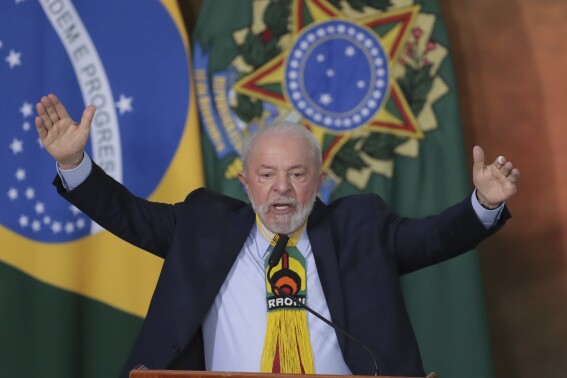|
Getting your Trinity Audio player ready...
|
Adam Kredo- FReew Beacon
The U.S. ambassador to Brazil’s silence on a series of anti-Semitic comments by far-left Brazilian president Luiz Inácio Lula da Silva has led to mounting concerns on Capitol Hill about the Biden administration’s failure to confront a wave of anti-Semitism in Latin America.
Elizabeth Bagley, the top U.S. diplomat in Brazil who once decried the pernicious “influence of the Jewish lobby” in politics, has spent weeks avoiding public comment on Lula’s comments, in which the Brazilian president accused Israel of behaving like Nazis and conducting a genocide in the Gaza Strip. The Washington Free Beacon reported last week that Bagley would not condemn the rhetoric or make herself available for an interview about them.
The Free Beacon’s reporting drove bipartisan concerns late last week during a House hearing on anti-Semitism in the Western Hemisphere, where far-left leaders like Lula are building relations with the Jewish state’s top enemies, including Iran. Rep. Bill Huizenga (R., Mich.) expressed concern about Bagley’s silence, saying the diplomat must more forcefully condemn anti-Semitism in Brazil, particularly in light of her own past comments about the “Jewish factor” in politics and its “money.”
“I’m concerned about our own ambassador to Brazil, Elizabeth Bagley,” Huizenga said during a Thursday House Foreign Affairs Committee hearing with Deborah Lipstadt, the State Department’s anti-Semitism envoy. “She has had some documented, very hateful comments she’s made about Jews, and my understanding from my Senate friends [is] it nearly derailed her Senate confirmation. Does her track record of those types of comments—has that somehow affected her ability or the U.S. ability to forcefully condemn da Silva’s comparison of Gaza to the Holocaust?”
“What I’ve seen from our post is that Post Brazil, Embassy Brazil, takes this issue very seriously,” Lipstadt said, declining to comment on Bagley’s past remarks on Jews and money in politics.
While Secretary of State Antony Blinken and State Department spokesmen have condemned Lula’s comparison of Israel to the Nazis, Bagley has not issued any public statement on the matter, even after the Free Beacon’s report and Thursday’s public hearing.
“I guess I’m more concerned about we having a forceful voice when we see this,” Huizenga said, adding that the lack of public condemnation sends the wrong message to our allies across Latin America. “I want to make sure our ambassadors are not just speaking out. I want them to be forcefully screaming about this.”
Rep. Kathy Manning (D., N.C.) also expressed how she “was shocked” by Lula’s anti-Semitic comments—for which the Brazilian president has refused to apologize—and asked Lipstadt to explain how the State Department is responding.
“What does the State Department have to say about this sort of anti-Semitic rhetoric?” she asked.
Lipstadt said that Blinken “spoke to [Lula] directly” about the comments and that “on the ground, there has been a significant body of people, political leaders, government leaders, who have taken issue with this statement. But it’s very disturbing.”
It remains unclear why the U.S. ambassador to Brazil has not publicly spoken out against Lula’s remarks, particularly since the State Department at large has publicly disputed them.
Bagley narrowly passed her Senate confirmation hearing after facing widespread opposition from Republican lawmakers who cited her past remarks about Jews.
In a 1998 interview first reported by the Free Beacon, Bagley decried “the influence of the Jewish lobby because there is major money involved.”
“The Democrats always tend to go with the Jewish constituency on Israel and say stupid things, like moving the capital to Jerusalem always comes up,” Bagley said. Political support for these issues is due to “the Jewish factor,” she said at the time, “it’s money.”




